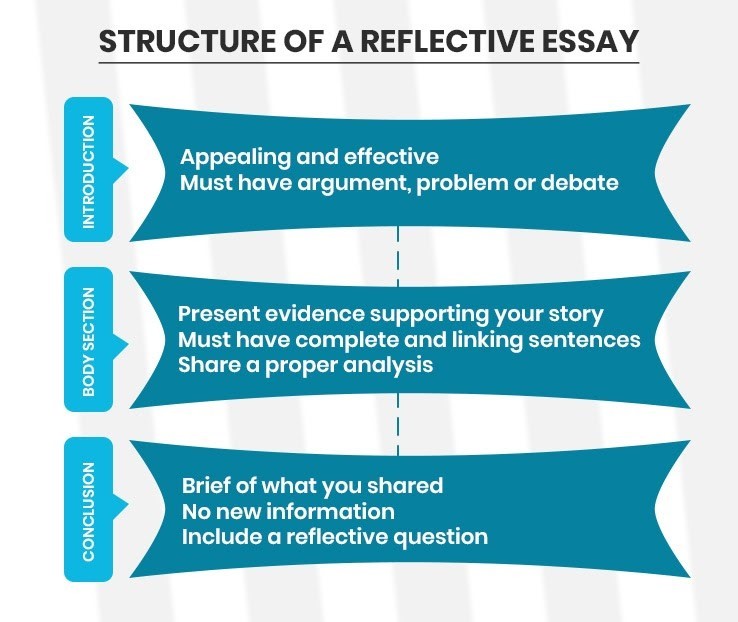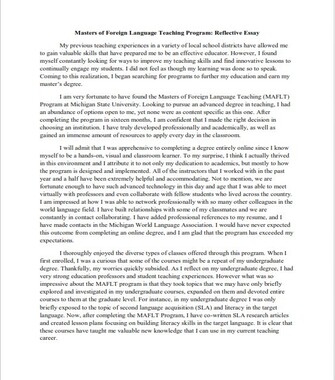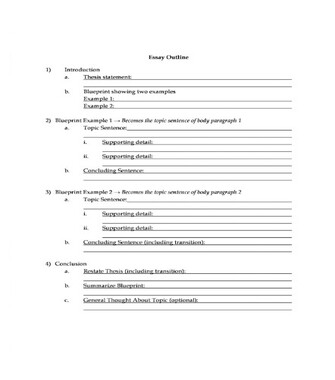
Think of the outline as a map – you plan in advance the points you wish to navigate through and discuss in your writing. Your work will more likely have a clear through line of thought, making it easier for the reader to understand. It’ll also help you avoid missing out any key information, and having to go back at the end and try to fit it in.
To recap, the key to writing a reflective essay is demonstrating what lessons you have taken away from your experiences, and why and how you have been shaped by these lessons.
– Once you’ve finished learning about and reflecting on your experience, consider asking yourself these questions: what did I particularly value from the experience and why? Looking back, how successful has the process been? Think about your opinions immediately after the experience and how they differ now, so that you can evaluate the difference between your immediate and current perceptions. Asking yourself such questions will help you achieve reflective writing effectively and efficiently.
It’s a real time-saver! Because the outline essentially serves as the essay’s ‘skeleton’, you’ll save a tremendous amount of time when writing as you’ll be really familiar with what you want to say. As such, you’ll be able to allocate more time to editing the paper and ensuring it’s of a high standard.
Reflection

A focus on personal growth:
A type of reflective essay often used by tutors as a strategy for helping students to learn how to analyse their personal life experiences to promote emotional growth and development. The essay gives the student a better understanding of both themselves and their behaviours.
The format of a reflective essay may change depending on the target audience. Reflective essays can be academic, or may feature more broadly as a part of a general piece of writing for a magazine, for instance. For class assignments, while the presentation format can vary, the purpose generally remains the same: tutors aim to inspire students to think deeply and critically about a particular learning experience or set of experiences. Here are some typical examples of reflective essay formats that you may have to write:
Reflective essays are those sorts of essays that seem oh so easy, and yet oh so hard to write, all at the same time. To put it simply, reflective essays constitute a critical examination of a life experience and with the right guidance, they aren’t very difficult to put together. A reflective essay is akin to a diary entry, except that others will be reading it so it needs to have a great deal of coherence and a good structure. In that regard, a reflective essay is much like any other essay out there.

It is the first statement that the reader read and decide to read the entire essay or not. The hook statement should start with a quote or an interesting question.
- Use the outline for your daily entries.
- Avoid repetitive sentences in the essay.
- State your own opinion in the essay.
- Make sure that you have supported every moment that seemed unclear to you before.
- Use transition words between paragraphs.
- Include all the key points in the outline.
- Don’t use complex words in the essay and present your point of view.
- Know the strong points that you need to showcase in the essay.
- Proofread and edit the essay before submitting or publishing it.
The reflective essay format is different from other essays. It is a type of writing in which an essay writer uses the MLA format or APA style.
The introduction is a small overview of the reflection essay topic. Briefly mention the main points related to the topic. In this section, you need to communicate directly with the purpose of the essay. The first few sentences give a glimpse of the big picture that you reveal in the body paragraphs.
Reflective Essay Conclusion

Creating the essay outline for a reflective essay is like getting your thoughts in order. It works as an essay bone structure. An essay outline is a way of organizing thoughts and ideas in one place.
Writing the outline is the first step of a well-written essay. An outline helps in your entire essay, and you don’t forget the essay’s main points.
The best essay starts with the perfect essay outline. An essay outline helps to get everything in order. It is the layout of one’s thoughts and ideas related to the specific topic. With an outline, you can easily structure properly.

Describe the main issues related to the topic. Use quotations and cite sources related to the literature. Include the precise examples of the events that occurred during this period.
The body paragraph is the next section after the introduction. Writing the body paragraphs is sometimes time-consuming if you have not prepared the perfect outline.
When writing the outline, one thing to keep in mind is the chronological order. Explain all the events in the logical order. Creating a good outline will make your essay writing phase easy and quicker.
- Describe the significance of the essay
- Identify personal intentions and link them with previous experiences.
- Think about future options
- Recognize your own beliefs
- Organize information in a sensible manner.
- Categorize the main points
Reflective Essay Outline Template

The essay introduction is based on your experiences, feelings, and situations. When you start writing the reflective paper introduction, focus on the main parts that make your introduction a good one.
"CollegeEssay" is the #1 Ranked Online home for great academic writing, essays, research papers, and graduate theses.
- Introduction
- Attention-grabbing hook
- Overview of the topic
- Thesis statement
- Body Paragraphs
- Paragraph 1 with a detailed description of event, person, or place
- Paragraph 2 with a description of thoughts and feelings
- Paragraph 3 with analysis and evaluation of the experience
- Conclusion
- Summary of the essay
- Restate the thesis statement
The third part will be related to your personal reflections about the event. You need to add supporting details about the event and make a successful essay. In this paragraph, you describe what lessons you have learned after experiencing the event.

The topic of the reflective essay can be derived from nature, places, relationships, and events. Below you will find a list of interesting reflective essay topics
Relationships are linked with strong emotions, and write a reflective essay about relationships means expressing the emotions and feelings you had. Some good reflective essay topics related to the relationship are:
In a reflective essay, you describe your personal memories, and no one else can write to them as you can. A reflective essay is sometimes known as a reading reflection essay.
- An amazing family reunion
- When you first spoke in public
- The role of friendship in my life
- When your parents punished you
- Family reunion
- When you told someone that you were sorry
- A time you spent with friends without parental supervision
- Describe your relationship with a family member
- A conversation when you became very angry
- The time when you had a long laugh
Study your Topic
The selection of an interesting topic is the first step in writing the perfect reflective essay. The reflective essay topics are personal and would come from your personal experience. With your personal experience, you can offer something unique to your readers.
"CollegeEssay" is the #1 Ranked Online home for great academic writing, essays, research papers, and graduate theses.
Choosing the right topic for a reflective essay can be a difficult task for many students. Writing a good reflective essay needs creativity and strong skills to express your emotions or feelings in the essay. Here are some guidelines that can help you to select a good reflective essay topic.
![]()
You can begin with creating a table with important points such as past experience, the description, and reflection. In the first row you can list the most important points that can be described in detail in the next rows. The second row will be about the experience and the third row will describe your personal response to the event. As soon as your table will be ready, you can create the following outline:
Step 1. Introduction. Every introduction to reflective essay writing should start with an attention grabber that will boost interest in your topic. The introduction is a small overview to the topic. It can be formulated as a question or contain a quote. The proposed thesis statement will be the starting point for subsequent reasoning. The reflective essay thesis statement will be about places, events, thoughts, experiences, or people that will be described further in the body paragraph. Check these examples of reflective essays or environmental design examples to get inspired and generate more ideas to start your essay.
Step 2. Check the text sentence by sentence. Look for wordiness, credibility, grammar, spelling, and accuracy. Tidy up the text paying attention to every detail. Proofread the text several times before submitting.
Step 1. Revise your first draft. Make sure that the reader will easily understand the text and make any changes to improve text readability. Depending on your taste, print the text and take a pen to make remarks, or write comments in a text file on a computer. Make sure that you have followed academic style while keeping a personal voice.
Reflective Essay Sample
![]()
Step 6. Create an outline. Creating a reflective essay outline will allow you to structure all your thoughts in a certain order. With the help of an outline you won’t find yourself struggling to add important parts to a previously completed paper. An outline is like a map of your future essay. If you want to come to a certain destination and at a particular time, you need to plan your trip. The same thing is true with an essay outline: to be able to finish writing before the deadline, you need a plan of action. Collect all information that arises in your mind and determine the points that stand out.
This is a method of creative reflection which allows the evaluation of the studied concept, process, or phenomenon in creative form. Cinquain is connected with the Japanese short poems called haiku and tanka. It is a poem of five lines, which is built according to these rules:
Your outline may be different, as it depends whether you need to reflect on a book or something else. The only thing you should keep in mind is chronological structure.
